Are SEO poisoning warnings warranted for Google Instant?
A security researcher has suggested Google Instant will aid Black Hat SEO attacks, but how concerning are his assertions?


ANALYSIS When tech giants launch impressive new products, they will often come under the scrutiny of security professionals.
Thus it should come as no surprise a security researcher has warned the new Google Instant search function could help improve hackers SEO campaigns.
Blackhat SEO threats use illicit methods to place malicious sites higher up on search rankings, and PandaLabs' Sean-Paul Correll has said Google Instant could help improve such methods.
"We know for a fact that most Blackhat SEO campaigns automatically query Google's trending topic results and now it seems that Google Instant will be suggesting those trending phrases (verbatim), potentially putting millions of victims directly in cyber criminals' cross hairs," Correll claimed.
The researcher tried a search for "antivirus" and found Antivir Solution Pro, a notorious rogueware infection, was one of the suggested search terms.
Of course, the previous version of Google search already suggested what was popular among web users when information was entered, similar to what Instant does. Therefore, one could query whether there is actually much difference between the new and older versions in terms of assisting malicious website creators.
In response to the concerns, a Google spokesperson simply told IT PRO the change did not impact the ranking of search results.
Get the ITPro daily newsletter
Sign up today and you will receive a free copy of our Future Focus 2025 report - the leading guidance on AI, cybersecurity and other IT challenges as per 700+ senior executives
"As with all changes to search, there will always be people who work to optimise their pages to fit the Google experience. There are no ranking changes with this enhancement and as always we continue to focus on showing user high-quality, relevant queries and search results," the spokesperson added.
There was no specific mention of SEO poisoning from Google.
A mini comparison
Luis Corrons, technical director of PandaLabs, told IT PRO he had tried out search on Google and Bing to compare which was better for returning fewer poisoned sites.
While Bing had fewer malicious results, Corrons was quick to point out cyber criminals will be more drawn to Google, simply because it is the most popular search engine.
"One thing for certain is that criminals are not focusing that much on Bing when compared to Google," Corrons said.
He also pointed to the quality and experience of security researchers at Microsoft.
"That helps a lot and is helping Bing be cleaner compared to Google," Corrons added.
"Google should try to [improve] as much as possible in avoiding this kind of stuff."
Conclusion... kind of
While the quicker results may aid Black Hat SEO attacks to some extent, in that results, including malicious ones, will be immediately accessible, it is hard to see how Google Instant places more power in the hands of cyber criminals.
Given that suggestions based on trending was already a feature in the previous version of Google and the search results are the same, hackers should not expect to get much more help with Instant than before.
Nevertheless, as Corrons suggested, the fight against this kind of attack should be something at the top of any search engine's priorities.
Tom Brewster is currently an associate editor at Forbes and an award-winning journalist who covers cyber security, surveillance, and privacy. Starting his career at ITPro as a staff writer and working up to a senior staff writer role, Tom has been covering the tech industry for more than ten years and is considered one of the leading journalists in his specialism.
He is a proud alum of the University of Sheffield where he secured an undergraduate degree in English Literature before undertaking a certification from General Assembly in web development.
-
 Should AI PCs be part of your next hardware refresh?
Should AI PCs be part of your next hardware refresh?AI PCs are fast becoming a business staple and a surefire way to future-proof your business
By Bobby Hellard
-
 Westcon-Comstor and Vectra AI launch brace of new channel initiatives
Westcon-Comstor and Vectra AI launch brace of new channel initiativesNews Westcon-Comstor and Vectra AI have announced the launch of two new channel growth initiatives focused on the managed security service provider (MSSP) space and AWS Marketplace.
By Daniel Todd
-
 Microsoft hikes Bing Search API prices to “reflect technology investments”
Microsoft hikes Bing Search API prices to “reflect technology investments”News Microsoft cited recent high-profile investments in Bing as justification for the price increases
By Ross Kelly
-
 How to change your search engine in Microsoft Edge
How to change your search engine in Microsoft EdgeTutorials If you'd rather search through Google than Bing, here's how to change your default search provider in Windows 10's new browser
By Adam Shepherd
-
 Microsoft joins Google in war on revenge porn with removal requests
Microsoft joins Google in war on revenge porn with removal requestsNews Both Google and Bing will allow people in explicit images to request they be removed from search results
By Caroline Preece
-
 Microsoft Bing will encrypt by default
Microsoft Bing will encrypt by defaultNews Microsoft will also no longer pass on customer search queries to marketers
By Clare Hopping
-
 Google right to be forgotten rule extends to Bing & Yahoo
Google right to be forgotten rule extends to Bing & YahooNews The EU’s controversial right to be forgotten ruling against Google will now also apply to Yahoo and Bing
By Caroline Preece
-
 Bing's search now includes academic research
Bing's search now includes academic researchNews Scholarly articles will also be featured in Microsoft's Cortana Personal Assistant
By Clare Hopping
-
 Windows 8.1 with Bing launched for budget devices
Windows 8.1 with Bing launched for budget devicesNews Microsoft launches Windows 8.1 with Bing, which is programmed to use its search engine by default
By Clare Hopping
-
 Microsoft sets out ad-free Bing vision for schools
Microsoft sets out ad-free Bing vision for schoolsNews Software giant announces ad-free Bing pilot scheme in US schools.
By Caroline Donnelly